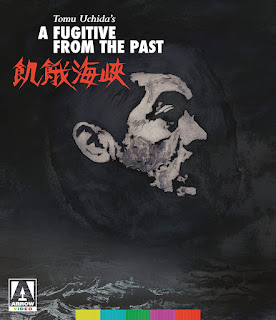A Fugitive from the Past
Best Of lists are, of course, purely subjective. But they’re still a whole lot of fun, and offer a good starting place for those interested in diving further down the rabbit hole of a complicated subject. And it doesn’t get much more complicated than Japanese cinema; not only because many of its film have never made it to North American shores, but social and cultural eccentricities can make the focus too narrow for a foreign audience. So Kinema Junpo’s (Japan’s oldest film magazine) 1999 list of the of the Top 100 Japanese Movies of all time is useful for new and old fans alike. And sitting at #3 is director Tomu Uchida’s A Fugitive from the Past from 1965, an epic latter-day film noir that’s one of the most accessible titles on the list.
Running from the law after a robbery gone wrong, Takichi Inukai shacks up for one night with a kind-hearted hooker, Yae Sugito, who takes an instant liking to him. In the morning, he leaves her with a stack full of bills and disappears. Yae uses the cash to pay off her debts and start a new life, but ten years down the line her fortune begins to wear thin. Spotting Inukai’s picture in the paper (under the name of a wealthy businessman), she visits to express her thanks…but winds up a cruel victim of a fate over a decade in the making.
Part police procedural, part melodrama, part noir, A Fugitive from the Past excels at all three. The script’s shifting perspective stretches out the story, illuminating and disguising important details as the plot develops. Uchida, whose style could adapt to fit any genre, manages to alternate hand-held verité visuals with somber landscapes to create an excitingly fluid visual experience. It’s a crime film that barrels towards a tragedy of Shakespearean proportions, full of guilt, love, honor and shame, that transcends its cultural origins, well deserving of that #3 ranking.
Arrow Video’s Blu-ray is a bit grainy, but that’s a common failing (if you can call it that) of Japanese films from the era. It’s nothing that distracts from the power of the restored 183-minute cut, with a 30-minute introduction by Jasper Sharp, scene specific commentaries by assorted film historians, theatrical trailer, image gallery, Tomu Ochida filmography and new artwork.




Comments
Post a Comment